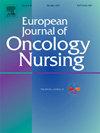A feasibility study of a coping-focused, couple-based family resilience intervention (CCFRI) in supporting couples experiencing colorectal cancer
IF 2.7
3区 医学
Q1 NURSING
引用次数: 0
Abstract
Purpose
Colorectal cancer patients and their spousal caregivers possess the potential to build family resilience and navigate the challenges of the cancer journey. However, few intervention studies have focused on enhancing family resilience among colorectal cancer couples. This study aimed to evaluate the feasibility, acceptability, and preliminary effects of a coping-focused, couple-based family resilience intervention guided by the Walsh Family Resilience Model.
Methods
A one-group, six-week pre- and post-intervention study was conducted. Six intervention sessions were delivered either face-to-face or by telephone. Quantitative data were collected using self-report questionnaires assessing family resilience, hope, family sense of coherence, spiritual well-being, perceived social support, and couple communication quality. Qualitative data were gathered through semi-structured interviews with open-ended questions and note-taking.
Results
A total of 24 colorectal cancer patient-spousal caregiver dyads were initially recruited for the intervention, but only 19 couples completed all six intervention sessions. Feasibility outcomes indicated a couple recruitment rate of 68.6% and a retention rate of 79.2%. Small to moderate improvements were identified in family resilience, hope, family sense of coherence, perceived social support, and couple communication quality, though spiritual well-being showed limited change. The majority of participants were satisfied with the intervention and provided valuable suggestions for future improvements.
Conclusions
This study showed that the coping-focused, couple-based family resilience intervention may effectively support colorectal cancer couples, improving adaptation and coping. Future research with larger samples is needed to confirm long-term effects and further refine intervention components.
以应对为重点,以夫妻为基础的家庭恢复力干预(CCFRI)在支持结直肠癌夫妇中的可行性研究
目的直肠癌患者和他们的配偶照顾者具有建立家庭弹性和应对癌症之旅挑战的潜力。然而,很少有干预研究关注于提高结直肠癌夫妇的家庭恢复力。本研究旨在评估沃尔什家庭弹性模型指导下以应对为中心、以夫妻为基础的家庭弹性干预的可行性、可接受性和初步效果。方法采用单组6周的干预前后研究。六次干预会议通过面对面或电话进行。定量数据采用自我报告问卷,评估家庭弹性、希望、家庭凝聚力、精神幸福感、感知社会支持和夫妻沟通质量。定性数据通过半结构化访谈和开放式问题和笔记收集。结果最初共招募了24对大肠癌患者-配偶照顾者,但只有19对夫妇完成了所有6次干预。可行性结果表明,夫妻入职率为68.6%,留职率为79.2%。在家庭恢复力、希望、家庭凝聚力、感知社会支持和夫妻沟通质量方面都有小到中度的改善,尽管精神幸福感的变化有限。大多数参与者对干预措施感到满意,并为未来的改进提供了宝贵的建议。结论以应对为中心、以夫妻为基础的家庭韧性干预可以有效支持结直肠癌夫妻,提高其适应和应对能力。未来需要更大样本的研究来确认长期效果并进一步完善干预成分。
本文章由计算机程序翻译,如有差异,请以英文原文为准。
求助全文
约1分钟内获得全文
求助全文
来源期刊
CiteScore
4.40
自引率
3.60%
发文量
109
审稿时长
57 days
期刊介绍:
The European Journal of Oncology Nursing is an international journal which publishes research of direct relevance to patient care, nurse education, management and policy development. EJON is proud to be the official journal of the European Oncology Nursing Society.
The journal publishes the following types of papers:
• Original research articles
• Review articles

 求助内容:
求助内容: 应助结果提醒方式:
应助结果提醒方式:


